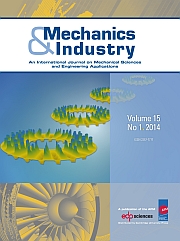Article contents
Performance prediction of a mixed flow turbine
Published online by Cambridge University Press: 17 May 2008
Abstract
Turbochargers are widely used in Diesel engines as a means of increasing the output power. Most of them are fitted with radial or mixed flow turbines. In applications where high boost pressure is required, radial turbines are replaced with mixed flow turbines with positive rotor inlet blade angle so that they can achieve a maximum efficiency at a lower value of blade speed to isentropic expansion velocity ratio than the usual 0.7 (for radial turbines). This study, performed with the ICEM and CFX softwares of ANSYS, presents a numerical performance prediction of a mixed flow turbine for a wide range of rotational speeds and pressure ratios. The influence of the clearance between the rotor tip blades and the casing on the turbine performances is also investigated. A simulation of the turbine under pulsed inlet flow conditions is also presented.
Keywords
- Type
- Research Article
- Information
- Copyright
- © AFM, EDP Sciences, 2008
References
- 1
- Cited by


